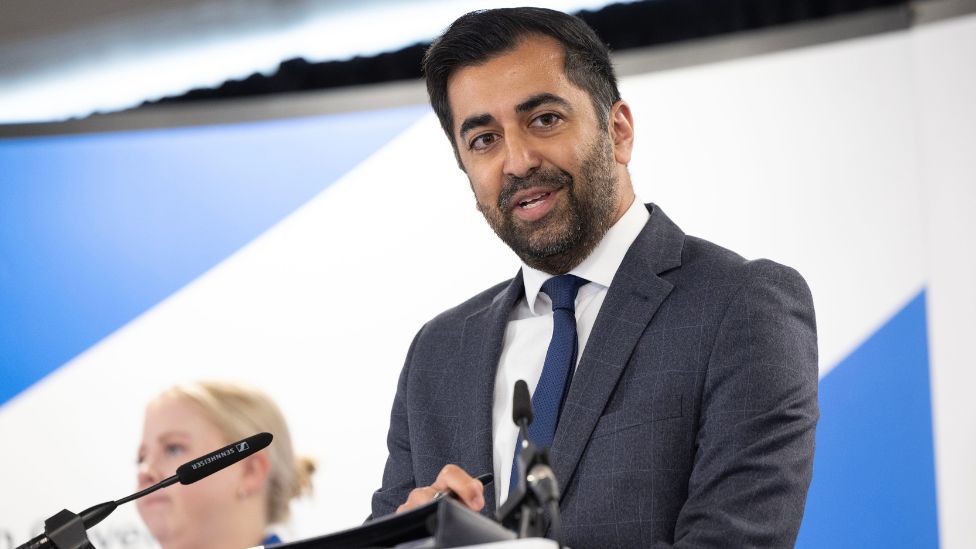
Mr Yousaf is launching the fifth prospectus in the Building a New Scotland series
First Minister Humza Yousaf is to unveil plans for citizenship in an independent Scotland.
The SNP leader will also set out proposals on Scottish passports, migrants’ rights and freedom of movement.
The prospectus will be the fifth in the Building a New Scotland series, which was launched by former first minister Nicola Sturgeon last year.
Opposition MSPs have labelled the plans a waste of taxpayers’ money.
It comes amid a row between Scottish and UK government ministers over spending on reserved issues.
At a launch event in Edinburgh attended by “New Scots” including Ukrainian and Syrian refugees, Mr Yousaf is expected to say an ageing population is one of the biggest threats facing future generations of Scots alongside climate change.
Speaking ahead of the launch, the first minister said strict UK immigration policies and Brexit were contributing to a decline in the Scotland’s working population.
The prospectus will propose that Scotland follows the Irish model to citizenship, allowing those born outside the country after independence to be automatically entitled to Scottish citizenship, if at least one of their parents is a Scottish citizen.
It will also outline the rights of British citizens to claim dual nationality at the point of independence and set out proposals to make it easier for those from overseas to apply for Scottish citizenship.
“The Scottish government wants to make it easier for people, including those seeking to reconnect with family roots, to gain citizenship and contribute to our economy, society and public services like the NHS,” Mr Yousaf said.
“An independent Scotland will be a welcoming country as part of our ambition to be an inclusive, progressive and prosperous nation.”
Previous Building a New Scotland papers have discussed plans to set up a formal constitution and argued comparable independent countries to Scotland are “wealthier and fairer than the UK”.
Other papers laid out economic proposals and said democracy can be “renewed” with independence.
Image source, PA Media
Creating a modern constitution for an independent Scotland was the fourth report in the Building a New Scotland series
Alexander Stewart, the Scottish Conservatives’ deputy constitution spokesperson, said the publication was a “blatant misuse of public money and resources by the SNP”.
Scottish Liberal Democrat communities spokesperson Willie Rennie said: “Writing these independence papers is more therapy for Humza Yousaf and the nationalist movement than a serious attempt to persuade people to support their cause.
“Even if it is just for a few hours, it must be a great relief to be distracted from broken ferries, ever longer waiting lists and a social care backlog that mushrooms.”
Mr Rennie also criticised the use of government time and money for something that “just isn’t going to happen”.
The paper is being launched amid a dispute over Scottish government ministers using civil service staff to develop policy in reserved areas such as independence.
The controversy surfaced as the House of Lords discussed possible revisions to the Cabinet Manual, a Whitehall document which codifies the conduct and operation of government and civil servants.
Labour peer George Foulkes suggested Scottish ministers could face financial penalties.
Image source, UK Parliament
Labour peer George Foulkes has criticised the Scottish government
He accused the SNP of “mischief making” as he told BBC Radio’s Good Morning Scotland the independence papers should be funded by the party instead of the government.
The peer said the the UK “was never meant to be a union of equal partners” and that such claims were an SNP “myth”.
“The Scottish Parliament should have the powers they have and they should exercise them,” he said.
“Whereas Westminster has responsibility on the constitution, on foreign affairs on defence and we should concentrate on that.”
Cabinet Office minister Lucy Neville-Rolfe told the Lords this week that “sanctions” for Scottish ministers would be considered as part of the Cabinet Manual review.
‘Independence is normal’
But Robert Hazell, a professor of government and the constitution at University College London who was involved in the compiling the Cabinet Manuel, told BBC Scotland it was “perfectly proper” for civil servants to work on the Scottish government’s agenda, including independence planning, under the current impartiality guidelines.
Mr Yousaf said the comments from Foulkes showed Scotland “is seen as secondary, an afterthought by Westminster”.
He added: “Independence, being equal to any other independent nation, is perfectly normal.”
And SNP MP Tommy Sheppard told BBC Scotland: “The people of Scotland elected a pro-independence majority of MSPs to Holyrood, on a manifesto commitment to deliver an informed choice on their constitutional future – and that is what we intend to do.
“No unelected Lord or UK minister will dictate how our democratic institution operates.”








